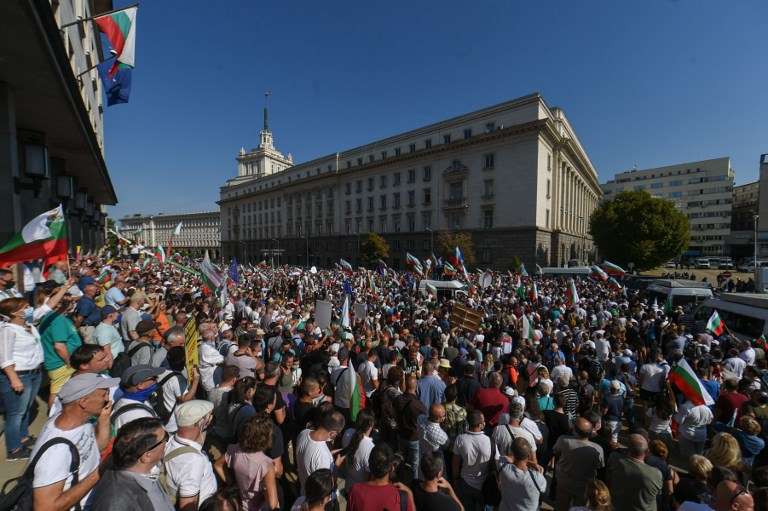The aftermath of Day 56 of mass protests in Bulgaria demanding the resignations of the government of Boyko Borissov and General Prosecutor Ivan Geshev is rather gruesome.
Social media have been swamped with hundreds of videos and pictures showing the arbitrary use of force by Bulgarian authorities against citizens who exercised their right to peaceful protests. Yet, that is not all.
A journalist covering the demonstrations was beaten up and arrested even though he showed his press card. The cameraman of a TV crew reporting from the protests was gassed, so he had to be taken to hospital for urgent treatment. A foreign reporter was threatened with violence because he was trying to film the police brutalities.
Along with the violence, Bulgarians will also remember the prolonged silence of EU institutions as one of the idiosyncrasies of these demonstrations.
An autocrat drowning in a sea of corruption and gold
Bulgarians first took to the streets in early July after the Prosecutor’s Office physically raided Bulgaria’s Presidency and arrested two of the President’s associates based on obscure charges. This was the last drop which filled the glass of scandals evidencing corruption and rule of law decay at the highest ranks of government.
Reputable indices, such as the Corruption Perceptions Index by Transparency International, Freedom Barometer by Friedrich Naumann Foundation for Freedom for East and Southeast Europe, and the World Bank Governance Indicators, suggest that Bulgaria is the most corrupt EU member.
These sad rankings do not merely reflect perceptions. Only in 2020, Bulgarians learned that Prime Minister Borissov, who follows in the autocratic steps of Hungarian Prime Minister Viktor Orbàn quite closely, was being investigated for money-laundering by Spanish authorities. They also saw pictures of his nightstand full of exorbitant amounts of cash and golden ingots and heard yet another shocking recording of him ordering who should be charged by the Prosecutor’s Office and whose business should be raided by state institutions.
Two independent forensic analyses — one commissioned by Bivol, Bulgaria’s partner of the Organized Crime and Corruption Reporting Project, and one by MEP Elena Yoncheva — concluded the leaked conversation was authentic.
While the Prosecutor’s Office, understandably, did not find the time to investigate the allegations in these recordings for it had to investigate itself, it attacked the Presidency as an institution at a time when the only vocal critic of Borissov with a high position in the state was President Rumen Radev.
When silence is not golden, but shameful
Whilst, unsurprisingly, citizens have been tirelessly protesting on the streets since the raid against the Presidency, the European Commission has chosen to ignore the corrupt elephant in the EU room.
Not only the Commission has not released a formal position regarding the 2-month long demonstrations against the corruption in Borissov’s government and the Prosecutor’s Office, but the faces of its spokespeople seem to turn blue when they are asked about the rule of law decay and the mass protests in the country at press briefings.
Meanwhile, the traditional explanation that the Commission is following the situation or monitoring Bulgaria in the areas of rule of law and the fight against corruption under the Cooperation and Verification Mechanism (CVM) does not seem to provide much comfort to those painfully watching the demise of the country’s democracy.
Many experts and civil society members seem to concur that the CVM has lost its legitimacy for assaults against the rule of law, such as the harassment and political subjugation of the judiciary, the increasing of the already excessive powers of the Prosecutor’s Office or the enactment of legislation compromising the defence of human rights, have either been ignored or marked as progress in the country’s CVM reports.
Predictably, citizens have also protested in front of the office of the European Commission in Bulgaria, asking whether the EU was blind.
Wasn’t democracy EU’s gold standard?
Bulgarians are well-aware that they are alone in this battle, which only fuels Brussels-skepticism which, if unattended, may easily transform into EU-skepticism. The developments in Poland and Hungary vis-à-vis the rule of law are comparable to those in Bulgaria. Yet, the standards endorsed by EU institutions seem dual.
Those looking forward to the new Rule of Law mechanism may sober up by examining Bulgaria’s 13-year bitter experience with the CVM.
At this stage, the Commission’s complicity with Borissov’s regime is quite evident. If the Commission has chosen to turn a blind eye to rule of law decay, one may wonder, at least, if it would condemn the horrifying police brutalities against citizens and journalists because, after all, Title I of the EU Charter of Fundamental Rights is dedicated to Dignity.
Bulgaria has lost a case for violating the right to life at the European Court of Human Rights because of a brutal police operation personally led by Boyko Borissov in his capacity of Secretary General of Bulgaria’s Ministry of Interior. Borissov did not face any consequences for this, so his benchmark is surely not golden.
Radosveta Vassileva


